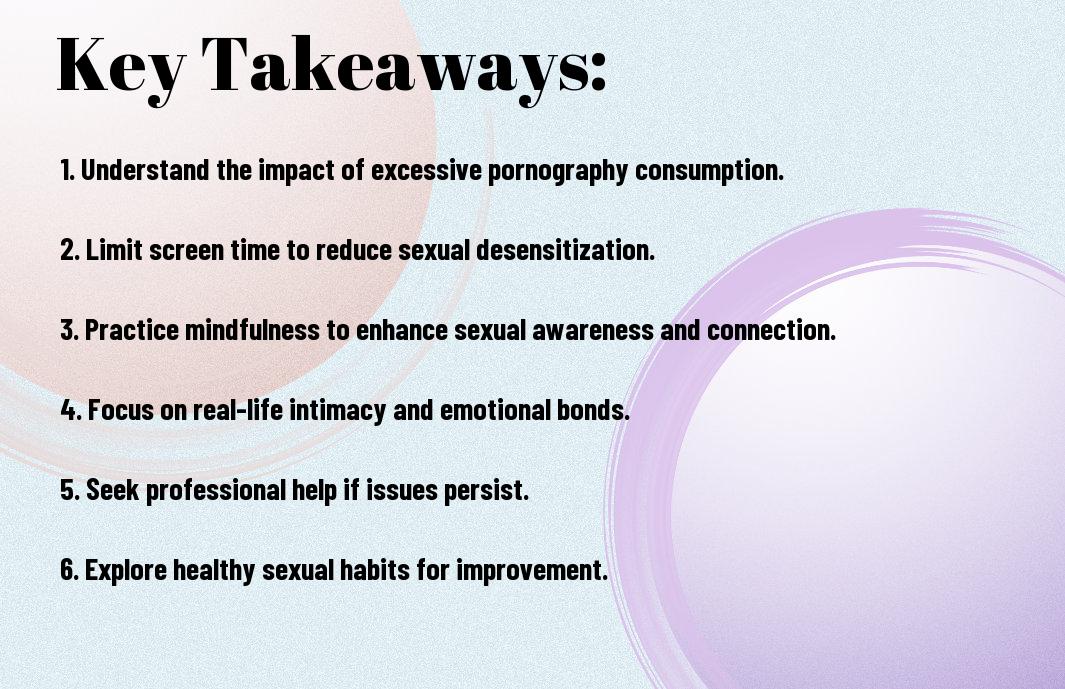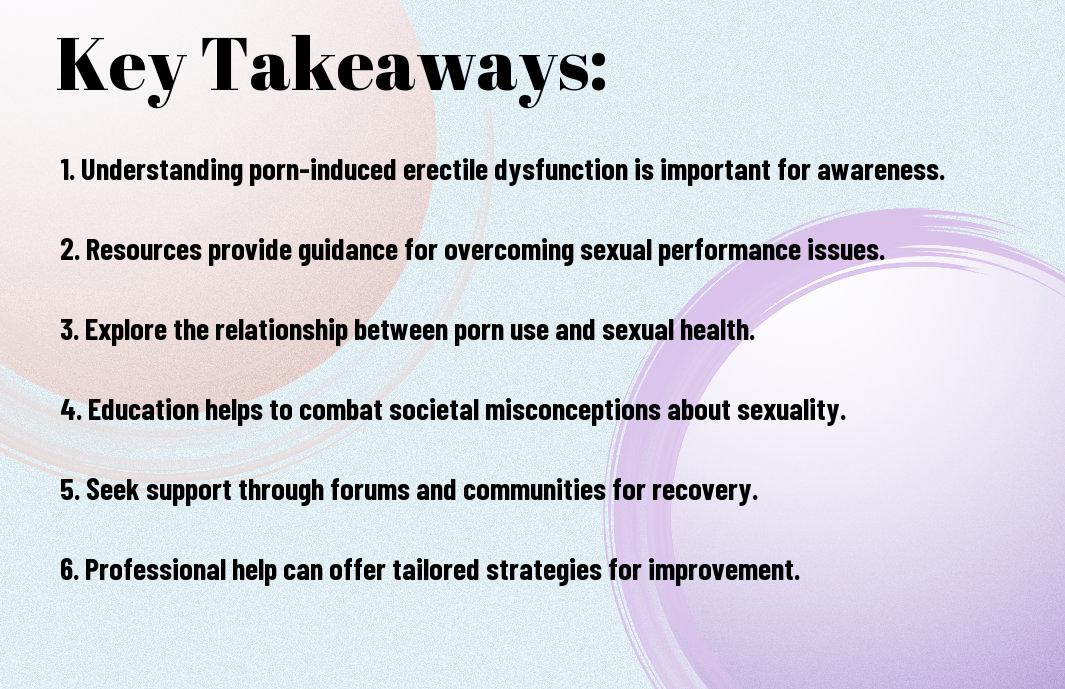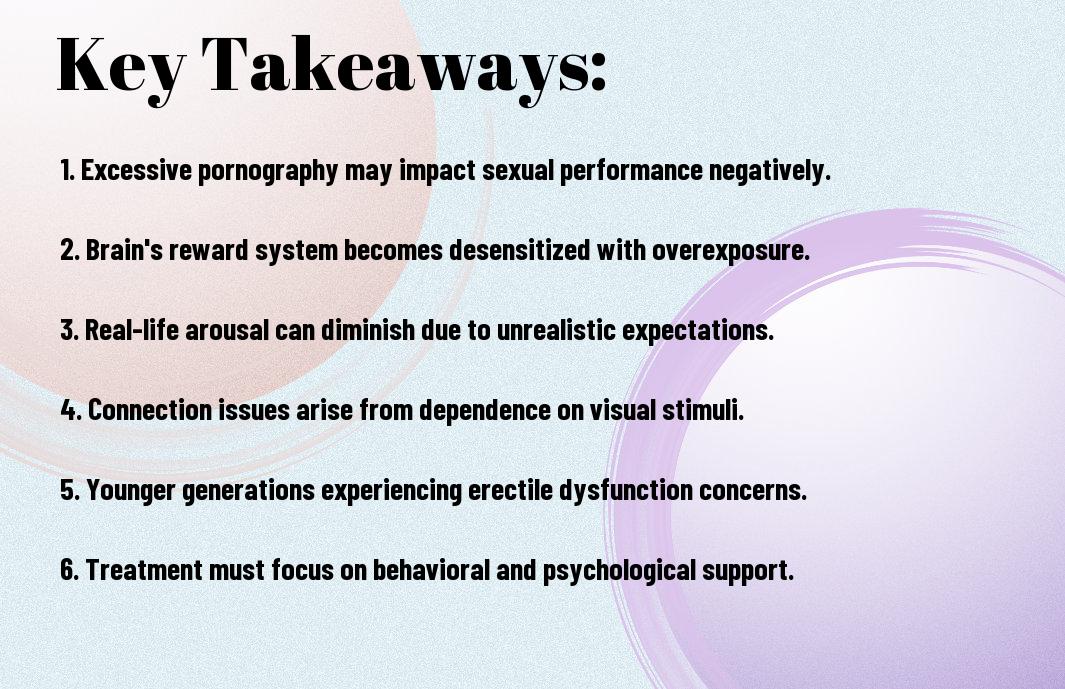Dysfunction in sexual health can be both alarming and challenging to address, especially when linked to modern habits like pornography consumption. As you navigate this complex issue, it’s necessary to understand the root causes and empower yourself with effective strategies for improvement. In this post, you’ll discover seven actionable tips tailored for 2025 that can help you regain control over your sexual health and enhance your overall intimacy. Let’s initiate on this journey together towards a healthier, more fulfilling sexual experience.
Key Takeaways:
- Understanding the link between excessive porn consumption and erectile dysfunction is vital for addressing the issue effectively.
- Gradual reduction in porn use, coupled with alternative sources of arousal, can help in regaining sexual function.
- Engaging in open communication with partners about sexual health can lead to better support and solutions.
- Incorporating healthy lifestyle changes, such as regular exercise and a balanced diet, can positively impact sexual performance.
- Seeking professional help or therapy may be beneficial for some individuals experiencing porn-induced erectile dysfunction.

Understanding Porn-Induced Erectile Dysfunction
The phenomenon of porn-induced erectile dysfunction (PIED) highlights the impact of excessive porn consumption on men’s sexual health. As you engage more with online adult content, you may find that it alters your arousal patterns or increases performance anxiety, which can ultimately lead to difficulties in achieving or maintaining an erection during intimate moments with a partner.
Definition and Symptoms
For those facing porn-induced erectile dysfunction, the symptoms may include difficulty obtaining or keeping an erection during sexual activity, reduced sexual desire, and a reliance on pornographic materials for arousal. These symptoms can create a significant impact on your sexual relationships and overall quality of life.
Causes and Contributing Factors
By understanding the causes and contributing factors of PIED, you can begin to address the issue effectively. Factors that may contribute to PIED include:
- Overexposure to pornographic content
- The brain’s desensitization to sexual stimuli
- Anxiety or stress regarding sexual performance
- Shifts in arousal preferences toward unrealistic scenarios
Recognizing these factors is key to overcoming the challenges associated with PIED.
Dysfunction often stems from a complex interplay of behavioral, psychological, and neurological elements. As you engage frequently with porn, your brain can become desensitized, leading you to require more extreme or novel stimuli to attain the same level of arousal. This desensitization can translate into difficulties when engaging in real-life sexual situations, making it hard for you to respond to your partner. Other contributors can include:
- Emotional distress related to relationships
- Low self-esteem or feelings of inadequacy
- Social isolation or lack of physical intimacy
Recognizing the multifactorial nature of PIED can help you approach it with a comprehensive mindset for better recovery.

The Impact of Pornography on Sexual Health
Any exposure to pornography can significantly affect your sexual health. Consuming pornographic material can alter your perceptions of intimacy and relationships, leading to unrealistic expectations and difficulties in real-life sexual encounters. Over time, this can create a disconnection between physical arousal and emotional intimacy, ultimately impacting your overall sexual satisfaction and function.
Psychological Effects
To understand the psychological effects, you need to recognize that frequent porn use can lead to anxiety, low self-esteem, and depression. These mental health challenges can affect your libido and perception of sexual norms, making it difficult to find satisfaction through real-life sexual experiences.
Physiological Changes
By engaging with pornography excessively, you could experience physiological changes that impact your sexual health. Studies suggest that the brain’s reward system may become desensitized, requiring more extreme content to achieve previous levels of arousal. This can lead to erectile dysfunction and decreased sexual performance in real-life situations.
Psychological factors often compound these physiological changes. When your brain becomes accustomed to the overstimulation from pornography, you may find it increasingly challenging to become aroused in a more natural setting. This desensitization can create a vicious cycle where you feel a need to rely on porn for stimulation, further diminishing your ability to engage meaningfully in sexual relationships.
Tips for Managing Porn-Induced Erectile Dysfunction
For those grappling with porn-induced erectile dysfunction, effective management strategies are vital. Here are some practical tips to consider:
- Seek professional support from a therapist or counselor.
- Engage in open communication with your partner.
- Limit exposure to pornography.
- Practice mindfulness and stress-reduction techniques.
- Focus on building intimacy outside of sexual experiences.
- Establish a healthy lifestyle through regular exercise and nutrition.
- Be patient with yourself during the recovery process.
After implementing these strategies, you can gradually improve your sexual health and regain confidence.
Reducing Exposure to Pornography
An effective method for managing porn-induced erectile dysfunction is reducing your overall exposure to pornography. This can be achieved by setting boundaries around your internet usage, utilizing website blockers, and avoiding triggers that lead to impulsive viewing. By consciously limiting your exposure, you may begin to notice improvements in your sexual responses and overall mental clarity.
Incorporating Healthy Sexual Practices
Exposure to pornography can skew your expectations of sexual intimacy, making it harder to perform in real-life situations. To counteract this, it’s vital to incorporate healthy sexual practices into your routine. Engage in activities that promote genuine connection and intimacy with your partner, such as cuddling, kissing, and exploring each other’s bodies without the pressure of sexual performance. Focus on enhancing emotional bonds rather than just the physical aspect of sex.
Sexual intimacy should be an experience grounded in trust, communication, and emotional connection. Taking the time to explore these facets with your partner can help create a more fulfilling sexual relationship, reducing anxiety and performance pressure. By prioritizing these experiences, you foster a healthier environment for your sexual well-being and can mitigate the impacts of porn-induced erectile dysfunction.

Seeking Professional Help
Your journey towards overcoming porn-induced erectile dysfunction can be significantly enhanced by seeking professional help. Mental health practitioners and sexual health experts can provide personalized strategies and support tailored to your unique situation. Engaging with a professional allows you to address underlying issues and develop healthier habits, ultimately fostering a more fulfilling sexual life.
Therapy Options
Options for therapy include cognitive-behavioral therapy (CBT), which helps reshape thought patterns associated with sexual arousal, and mindfulness-based therapy, which focuses on present-moment awareness and reduces anxiety. Engaging in couple or sex therapy can also foster open communication, addressing relationship dynamics that may contribute to your symptoms. These avenues can be invaluable as you work towards recovery.
Medical Interventions
With the help of medical professionals, you can explore various medical interventions to alleviate symptoms of erectile dysfunction. This may include prescriptions, hormone therapy, or consultations regarding lifestyle changes that can enhance sexual function. Working collaboratively with a healthcare provider ensures that you receive appropriate and tailored options for your needs.
Interventions can vary significantly, tailored to the specific causes of your erectile dysfunction. For some, medications such as phosphodiesterase type 5 inhibitors may be effective, while others might benefit from hormone therapy if hormonal imbalances are identified. Lifestyle changes, including exercise, diet modifications, and stress management, can also play a pivotal role in improving sexual health. Regular follow-ups with your healthcare provider can ensure your treatment plan remains effective and responsive to your progress.
Lifestyle Changes for Improved Sexual Health
Now is the perfect time to evaluate your lifestyle choices and how they impact your sexual health. Adopting healthier habits can significantly enhance your sexual performance and overall well-being. Focus on incorporating dietary changes, physical activity, and stress management techniques into your daily routine, and you’ll find a more robust foundation for a fulfilling sexual life. It’s never too late to prioritize your health, and the benefits will extend well beyond the bedroom.
Diet and Nutrition
About 70% of what you consume plays a role in your sexual health. A balanced diet rich in whole foods can boost blood flow and hormone levels, necessary for maintaining erectile function. Include plenty of fruits, vegetables, lean proteins, and healthy fats in your meals. Avoid processed foods and excessive sugar, which may contribute to erectile dysfunction. Opt for foods rich in nitric oxide, such as beets and spinach, to enhance circulation and improve sexual vitality.
Exercise and Physical Activity
Among the many benefits of regular exercise, enhancing your sexual health is key. Engaging in physical activity boosts blood flow, increases stamina, and can help manage weight, all contributing to improved erectile function. Incorporating aerobic exercises like running or swimming and strength training into your routine can improve your cardiovascular health, reducing the risk of erectile dysfunction.
The body responds positively to a consistent exercise routine, enhancing not only physical fitness but also mental well-being. Workouts release endorphins that reduce stress and anxiety, which can often hinder sexual performance. Aim for at least 150 minutes of moderate aerobic activity weekly, coupled with muscle-strengthening exercises on two or more days. These changes not only better your sexual health but can also enhance your overall quality of life.
The Future of Sexual Health Awareness
Despite the ongoing challenges surrounding sexual health, awareness is poised to evolve significantly in the coming years. As more individuals recognize the potential implications of porn on sexual performance, educational efforts will shift towards fostering open conversations and promoting healthy relationships with sexuality. This increasing focus on sexual health awareness will help destigmatize issues like porn-induced erectile dysfunction, making it easier for you to seek the help and resources you need.
Education and Resources
Any platform that provides clear, accessible information about sexual health will become necessary in your journey towards understanding and overcoming issues associated with porn use. Educational initiatives aimed at adolescents and adults alike will equip you with the knowledge needed to make informed choices and engage in healthier sexual practices, leading to better overall well-being.
Role of Technology
The future of sexual health awareness will heavily depend on advancements in technology, which can facilitate better access to information, therapy, and support. With innovative resources like apps and online platforms, you can connect with professionals and peers who understand your struggles, providing a safe space to discuss and find solutions to concerns like porn-induced erectile dysfunction.
To fully leverage the role of technology, consider utilizing online tools and platforms specifically designed for sexual health. These resources may offer customized programs, community support forums, and access to teletherapy, helping you revolutionize your approach to sexual well-being. Engaging with technology not only broadens your understanding but also opens up avenues for solutions tailored to your unique needs and experiences.
FAQ
Q: What is Porn-Induced Erectile Dysfunction (PIED)?
A: Porn-Induced Erectile Dysfunction (PIED) refers to the difficulty in achieving or maintaining an erection due to excessive consumption of pornography. Over time, frequent exposure to pornographic material can desensitize an individual to sexual stimuli, making it challenging to experience normal sexual arousal with real-life partners.
Q: How can I identify if I have PIED?
A: Signs of PIED include difficulty getting aroused during intimate moments with a partner, a reliance on pornography for sexual satisfaction, and an overall decrease in sexual desire. If you find that porn is your primary source of sexual arousal and it negatively impacts your sexual relationships, you might be experiencing PIED.
Q: What steps can I take to overcome PIED in 2025?
A: Overcoming PIED involves several strategies, including reducing or eliminating pornography use, engaging in open conversations with partners about sexual health, seeking therapy or counseling, focusing on healthy sexual practices, and developing stronger emotional connections with partners. Implementing these steps can help improve sexual function and intimacy.
Q: Are there specific tips recommended to help with recovery from PIED?
A: Yes, here are 7 tips that can aid in recovery: 1) Gradually reduce porn consumption, 2) Engage in more real-life sexual encounters, 3) Focus on mindfulness and connection during intimate moments, 4) Consider counseling or therapy, 5) Explore new avenues of intimacy, 6) Participate in support groups, and 7) Educate yourself on sexual health and function.
Q: Can relationship issues contribute to PIED?
A: Absolutely. Relationship dynamics, such as lack of communication, trust issues, or emotional disconnect, can exacerbate PIED. Healthy relationships based on honesty, understanding, and emotional connection are crucial for sexual satisfaction and can help alleviate symptoms of PIED.
Q: Is it necessary to see a healthcare professional for PIED?
A: While not always required, consulting a healthcare professional can be beneficial, especially if symptoms persist or worsen. A health professional can provide support, assess any underlying issues, and recommend appropriate treatment or therapies tailored to your specific needs.
Q: How can lifestyle changes support recovery from PIED?
A: Lifestyle changes play a significant role in recovery from PIED. Regular exercise, a balanced diet, sufficient sleep, and proper stress management can enhance overall health, improve mood, and boost libido. By promoting physical well-being, you can foster a more positive relationship with your sexual health.








